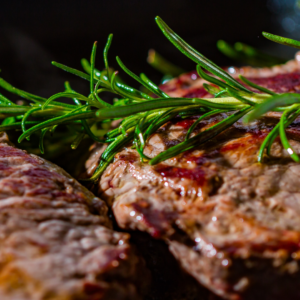Do you feel differently when you eat different foods?
That might sound like a silly question, but different foods affect us differently.
I feel different when I eat salad, compared to steak, compared to ice cream, compared to bread, etc. And how I feel when I eat a lot of bread is going to be different to how YOU feel when you eat a lot of bread.
Just like foods affect how we feel during the day, they can also impact how we feel at night. My guess is that there are quite a few people who suffer from sleep disruptions related to food, that they might not be aware of.
There are a few ways foods can interfere with sleep:
Heartburn or indigestion
Oh, that good old burning feeling! It’s pretty recognizable isn’t it. I had awful heartburn when I was pregnant, and I hated every second of it. But it still creeps in every now and then, and sometimes it wakes me up at night when I haven’t been eating great foods.
The most common foods that cause heartburn are really acidic ones – tomatoes, alcohol, spicy foods, chocolate, fatty or fried foods, onions, citrus fruits
(Although I get the theory as to why citrus fruits can cause heartburn, I’ve never actually known anyone who has had heartburn triggered by lemons).
One of the reasons heartburn can be worse at night is just because of physical positioning. When we’re laying down, there is more risk of stomach acid going back up into our esophagus. A common recommendation is to actually prop the head of your bed up a little bit, so you’re not lying quite so flat.
Late night eating
This can show up as heartburn or indigestion, but if we eat too late at night, the digestive process that has to happen while we’re asleep might be significant. Our bodies are not meant to be digesting while we sleep – it has quite a few other things it needs to be doing then.
If we eat too late and our body is still digesting, it’s not uncommon that part of that process will cause us to wake up. And usually we won’t feel good. Maybe nauseous, indigestion, heartburn, or just uncomfortable feeling.
Food sensitivities
I won’t get too into the weeds on this topic, but food sensitivities can drastically impact all sorts of things in our life, including our sleep.
A quick background of what food sensitivities are!
Food allergies (like a peanut allergy) is an immune reaction to foods like peanuts.
Food sensitivities are also an immune reaction to foods, but it’s a different part of the immune system that responds.
In food allergies, we see a very strong, fast inflammatory reaction. There’s a lot of swelling, redness, itchiness, hives, etc.
In food sensitivities, we also see inflammation, but not quite to the same extent, and it often shows up differently. Inflammation in food sensitivities might be joint pain, or skin issues (like eczema, psoriasis, etc.), or anything digestive, and the list goes on.
But food sensitivities can cause things like back pain or joint pain or heartburn or bloating or basically anything that might cause us to be uncomfortable and wake up at night.
So if you are eating a lot of food that you’re sensitive too, it can cause almost any symptom you might imagine, including night time waking (or even a hard time falling asleep).

My no-good-very-bad-for-me foods
I’ll share two foods that really bother me and I know if I eat them (especially if I eat too much of them), they’ll disrupt my sleep:
Red meat – We eat red meat probably once a week, and while it’s not my favorite food, I don’t mind it (my husband and my kids love it, so I really eat it for them). But I know if we have red meat for dinner, particularly steak or roast or something on the fattier side, I am going to wake up at night not feeling well. It happens every time. I think it’s a combination of the highly acidic food, the fattier cuts of food (extra lean ground beef doesn’t seem to bother me as much) and maybe a food sensitivity. But I know it’s a problem for me.
Wheat – This is another big no-no for me. I definitely have a food sensitivity to wheat and/or gluten (more on that another time if you’re interested). If I eat pizza or bread or something containing wheat, especially towards the end of the day, I can guarantee that will interfere with my sleep. I do mostly avoid these foods, but on the rare occasion that I don’t, I know that my sleep will be disrupted.
What to do about it?
If you’re curious about how specific foods are impacting your sleep, I would highly recommend spending a week tracking your food intake and your sleep. Make a note of what you eat throughout the day, and then make a note of how you sleep that night. If you have a hard time falling asleep or staying asleep, see if there are any connections or patterns with the food you ate that day.
But always keep the common ones in mind like I listed above. On nights you eat those, maybe track your sleep and see if it changes.
Do you have any foods that you know impact your sleep?
Do you suspect there are specific foods that impact your sleep?
Comment below!
